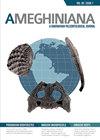基于有限元分析的新翼龙颅骨生物力学研究
IF 1.5
4区 地球科学
Q3 PALEONTOLOGY
引用次数: 4
摘要
摘要Aetosaurs是三叠纪晚期在世界范围内分布的四足始祖龙。相对于体型,它们的头部较小,尾巴较长,其特征是背部和腹部的甲壳由装饰和铰接的骨皮形成。尽管埃特龙在历史上被认为是早期伪苏类始祖龙中唯一的草食性动物,但很少有分析能定量评估它们的进食习惯,一些作者提出了该类群的杂食性和/或觅食习惯。engaeus新埃塔龙是一种产于阿根廷拉里奥哈Los Colorados组三叠纪晚期的埃塔龙。恩加伊猪笼草有三个保存相对完好的头骨,是研究觅食生态学的优秀分类单元。我们应用有限元方法来估计食物加工过程中不同位置头骨的咬合力和结构响应。我们的研究结果表明,N.engaeus的头骨产生了3.6 kN的咬合力,与密西西比扬子鳄的测量值相当,并且在进食过程中可以抵抗横向和纵向力。这表明N.engaeus能够用颚捕食小型活体猎物(如食蟹齿龙),和/或拖曳较大体型的尸体(如双食蟹齿兽)。这些结果带来了新的证据,支持N.engaeus可能的浮游动物或杂食性,从而扩大了以太龙的潜在生态作用。本文章由计算机程序翻译,如有差异,请以英文原文为准。
Biomechanical Skull Study of the Aetosaur Neoaetosauroides engaeus Using Finite Element Analysis
Abstract. Aetosaurs are quadrupedal archosaurs that had a worldwide distribution during the Late Triassic. They had small heads relative to their body size and a long tail, and they are characterized by a dorsal and ventral carapace formed by ornamented and articulated osteoderms. Although aetosaurs historically have been considered the only herbivorous among the early pseudosuchian archosaurs, few analyses quantitatively assess their feeding habits, and some authors have proposed omnivorous and/or scavenging habits for the group. Neoaetosauroides engaeus is an aetosaur from the Late Triassic of the Los Colorados Formation, La Rioja, Argentina. N. engaeus is known from three relatively well-preserved skulls, making it an excellent taxon to study the feeding ecology. We applied the Finite Element Method to estimate bite force and to evaluate the structural response of the skull at different positions during food processing. Our results show that the skull of N. engaeus generated a bite force of 3.6 kN, a magnitude comparable with the measurement made in Alligator mississippiensis, and could resist lateral and longitudinal forces during feeding. This indicates that N. engaeus was capable of hunting of small living prey (e.g., cynodonts) with its jaws, and/or dragging carcasses of larger sizes (e.g., dicynodonts). These results bring new evidence that supports possible zoophagy or omnivory for N. engaeus, thus expanding the potential ecological roles of aetosaurs.
求助全文
通过发布文献求助,成功后即可免费获取论文全文。
去求助
来源期刊

Ameghiniana
地学-古生物学
CiteScore
2.50
自引率
10.00%
发文量
21
期刊介绍:
Ameghiniana is a bimonthly journal that publishes original contributions on all disciplines related to paleontology, with a special focus on the paleontology of Gondwana and the biotic history of the southern hemisphere. Published yearly since 1957, it has undoubtedly become the main palaeontological publication from Latin America. Ameghiniana has recently broadened its editorial board, reorganized its production process, and increased to a bimonthly frequency, which resulted in a significant decrease in the turn around time.
 求助内容:
求助内容: 应助结果提醒方式:
应助结果提醒方式:


